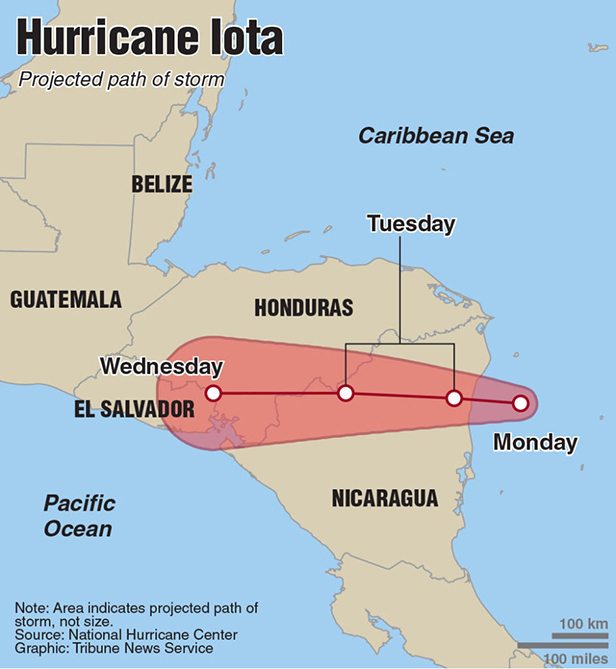Canadian News November 18, 2020
Hurricanes in Central America Could Affect Promo
The region, home to a number of garment factories that serve the promo industry, suffered extensive damage as a result of Hurricane Eta. It’s now grappling with Iota.
They were devastated by Hurricane Eta just a few weeks ago. Now, Nicaragua and Honduras, home to major garment production facilities that serve the promotional products industry, are dealing with the immediate aftermath of Hurricane Iota that made landfall this week.
Some promo pros are predicting that damage from the storms could affect garment production, with inventory levels already an issue from COVID-related shutdowns earlier this year. Several apparel suppliers are also raising funds to help their factory workers and others who lost their homes in the storms.
Many communities on the eastern coasts of Nicaragua and Honduras are still under water as a result of Eta, according to the Associated Press. That storm made direct landfall on Nicaragua’s coast as a Category 4 hurricane with windspeeds of 140 mph and rapidly moved through the region, including neighboring Honduras. Residents were evacuated and placed in shelters, though water rescues from rooftops and porches continued for several days as floodwaters and landslides overwhelmed towns across the country.
Two weeks later, on Monday, Nov. 16, Iota made landfall in the same general area as a Category 4 hurricane, with winds of 155 mph. It’s the strongest storm ever to hit Nicaragua, according to the government there. While it’s since weakened significantly after passing over Central America, the area is now dealing with yet another round of torrential rains and property damage from winds, flooding and mudslides.

Graphic showing the path of Iota; National Hurricane Center/Tribune News Service
In Tegucigalpa, Honduras’ capital, residents of flood- and landslide-prone areas were evacuated ahead of Iota’s arrival.
“What affected us most here was the flooding,” Teonela Paisano Wood, mayor of Brus Laguna, a municipality on Honduras’ remote Caribbean coast, told the AP. “The Barra Patuca sector has been flooded for the last two weeks. We are in danger if it keeps raining.”
The widespread damage from Iota remains to be fully assessed. Early reports indicate that the region has been devastated by felled trees and electric poles, and roofs sheared off homes and businesses. Currently, more than 40,000 people remain in shelters, according to Guillermo González, director of Nicaragua’s emergency management agency. Across the region, at least 130 people have died as of this writing.
The storms may impact garment production, which could affect a promo supply chain that’s had a difficult year during COVID. Ryan Moor, CEO of Ryonet and founder of eco- and socially conscious Allmade Apparel (asi/34341), said he’s gotten word from contacts in Honduras that the situation is very serious. He traveled there last year when Top 40 supplier SanMar (asi/84863) and Allmade were planning their exclusive partnership.
“I think the apparel industry is going to be heavily impacted by this,” he says. “So many shirts are already out of stock due to COVID shutdowns, and this is going to create setbacks.” Moor created a video last week to raise awareness to the devastation of Eta in Honduras. He says the SanMar factories themselves seem to have survived relatively unscathed, but more than 500 workers have lost homes and infrastructure is heavily damaged.
View this post on Instagram
Among the apparel suppliers with facilities in Honduras is Montreal-based Gildan. Genevieve Gosselin, director of corporate communications and marketing, says that its operations in Nicaragua and sewing facilities in Honduras were minimally impacted by Eta. But the company’s Rio Nance manufacturing complex in Honduras’ Sula Valley was more heavily impacted, and Gildan temporarily stopped production at the facility before starting it back up late last week.
“As you would expect, we again temporarily halted production at this and other locations in Central America for what we expect will be a few days as we deal with Iota,” she says. “We continue to be able to service our customers from other locations in our global manufacturing system and from strong existing inventory levels at our distribution centers in the U.S., Canada, Europe and Asia.”
To help employees and their communities, Gildan also contributed emergency kits with food, water and toiletries; teamed up with local organizations to distribute T-shirts, fleece, socks, underwear and masks; offered free medical care for employees at on-site clinics; and donated kits, sleeping mats and masks to shelters in the Sula Valley. The company plans to continue offering supplies and medical care as needed the aftermath of Iota.
HanesBrands (asi/59528), which operates facilities in the Dominican Republic, El Salvador and Honduras, had nearly 700 employees displaced by the storms, with many losing their homes and all their belongings.
Hurricane Eta slammed into Honduras causing widespread devastation. Many families, including 700+ of our employees, lost everything.
— Hanesbrands Inc. (@HanesBrands) November 13, 2020
We are sending apparel and significant monetary support to purchase necessities.
If you can help, please donate: https://t.co/21W2692ZJW pic.twitter.com/yA0n3He9Gf
Recently, HanesBrands entered into a 10-year partnership with nonprofit Glasswing International and donated more than $1.2 million towards school upgrades and afterschool activities, as well as continuing development opportunities for teachers in Honduras. And in 2018, Gildan donated more than half a million dollars to refurbish Majoncho Sosa Community Park in San Pedro Sula, Honduras, where Gildan is the largest private employer, according to the company.
“We have to do all we can as an industry to help [these facilities] get back to production,” says Moor. “That will go a long way, especially as the busy holiday season approaches.”
